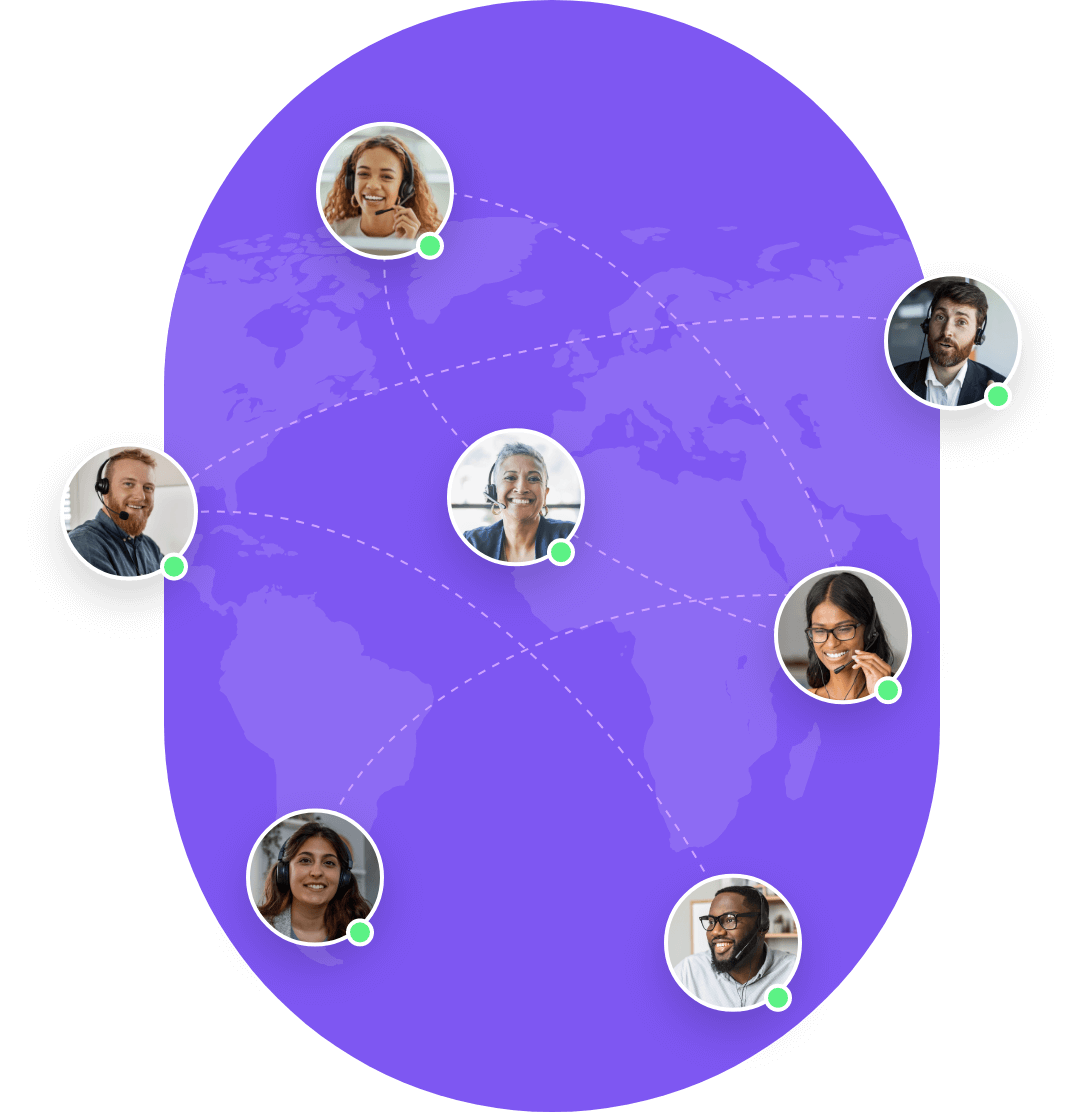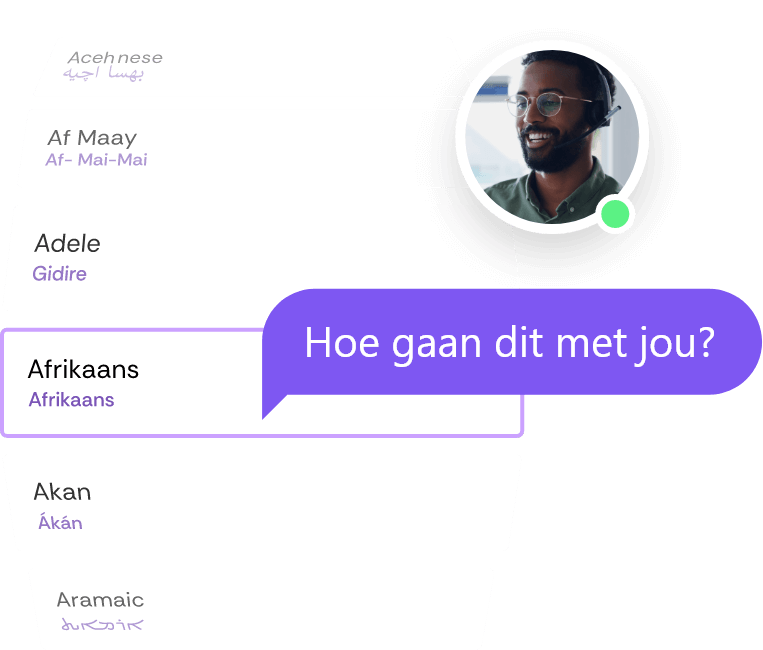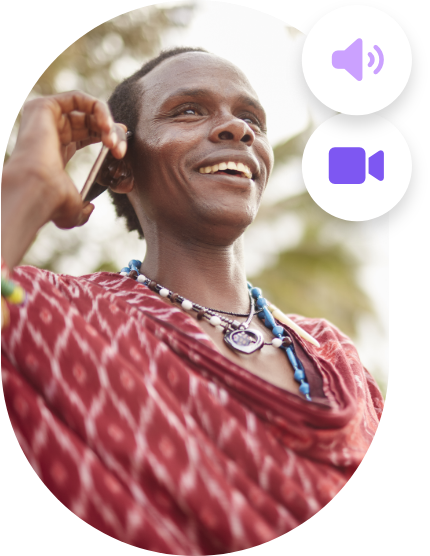
Rare and indigenous interpreters play a vital role in preserving cultural heritage, fostering understanding, and ensuring that no voice goes unheard.
Jeenie’s Direct-To-Interpreter platform opens the doors for rare & indigenous language interpreters and those who need interpreting access worldwide.

We’re addressing the growing demand for rare and indigenous languages with the most comprehensive list of rare dialects and languages available on-demand and on video.

Including languages like:

Users can choose between video remote interpreting (VRI) or audio interpreting over the phone (OPI) to support both signed and spoken languages.
Access language support on-demand for urgent needs or schedule a session in advance for your convenience.
Jeenie's trusted network of expert interpreters covers over 300 languages, featuring the widest range of rare and indigenous dialects available.
Each interpreter is rigorously assessed to ensure they maintain impartiality, uphold confidentiality, and demonstrate deep respect for all individuals and cultures in their work.

Expower informed care decisions, prevents misunderstandings, and fosters trust between patients and healthcare providers.
Allow students to fully engage with the curriculum, participate in class discussions, and comprehend academic materials, regardless of their native language.
Guarantee that individuals from marginalized communities know their rights and have equitable access to legal representation, humanitarian aid, and critical services.
Enable individuals from all backgrounds to take part in government forums, public meetings, and policy discussions.
Expand their outreach and ensure their messages, programs, and resources are accessible to all community members.
Expower informed care decisions, prevents misunderstandings, and fosters trust between patients and healthcare providers.

Allow students to fully engage with the curriculum, participate in class discussions, and comprehend academic materials, regardless of their native language.

Guarantee that individuals from marginalized communities know their rights and have equitable access to legal representation, humanitarian aid, and critical services.

Enable individuals from all backgrounds to take part in government forums, public meetings, and policy discussions.

Expand their outreach and ensure their messages, programs, and resources are accessible to all community members.

Yes – this is actually one of Jeenie’s greatest strengths. Jeenie has the #1 on-demand service in the U.S. for rare and indigenous languages. In practical terms, that means you can request interpretation for languages that are very hard to find elsewhere, and Jeenie will likely have an interpreter available. For example, Jeenie supports numerous Central American indigenous languages like Mam, Q’eqchi’, K’iche’, and others which frequently arise in refugee or immigration contexts. We also cover languages of limited diffusion from Africa, Asia, and the Pacific – anything from Marshallese or Chuukese, to Kinyarwanda, Amharic, Wolof, and so on. While many language service providers only focus on common languages, Jeenie has built an extensive network that includes hundreds of dialects and minority languages. If a language isn’t immediately in our catalog, we can often source it quickly. So the short answer is: yes, Jeenie not only provides rare language interpreters, we excel at it, giving you access to dialects and indigenous tongues that few other services can handle on-demand.
Jeenie leverages global, direct relationships with interpreters to recruit top talent in rare languages. Because Jeenie works directly with linguists (rather than through layers of subcontractors), we can identify qualified interpreters in specific communities and bring them onto the platform quickly. Every interpreter – whether for Spanish or for an indigenous language – goes through Jeenie’s rigorous vetting process and quality assurance program. This includes proof of language proficiency, interpreting experience, and often subject-matter knowledge (for instance, medical or legal interpreting credentials if applicable). Jeenie also has mechanisms to ensure ongoing quality: interpreters are rated by clients after each call and must maintain excellent ratings to stay active. Thanks to the direct-to-interpreter platform, Jeenie can quickly launch a new language when a client need arises. In summary, Jeenie actively scouts and vets rare-language interpreters with the same care as any other, and its direct network model allows us to expand language offerings nimbly while maintaining quality.
In addition to all the common world languages, Jeenie offers many that are considered “rare” in the language services industry. For example, Mayan languages like Mam, Q’anjob’al, K’iche’, and Q’eqchi’ are available on-demand
– These are indigenous languages spoken in parts of Guatemala and Mexico (and by immigrant communities elsewhere). Jeenie also supports various languages of limited diffusion such as Haitian Creole, Marshallese (from the Marshall Islands), Chuukese (Micronesia), Rohingya (Myanmar/Bangladesh), Swahili and Wolof (Africa), Burmese, Karen, and Hmong (Southeast Asia), among others. Even within more broadly spoken languages, Jeenie can handle specific dialects – e.g., Sudanese Arabic or Cantonese in addition to Mandarin. In fact, Jeenie’s language list runs “from Akateko to Zyphe,” literally A-to-Z, covering hundreds of languages and dialects. This means organizations that encounter a wide diversity of language needs (be it a hospital treating rare-language patients or an immigration office interviewing refugees) can rely on Jeenie to provide those interpreters. It’s a level of coverage that sets Jeenie apart – many providers simply cannot name as many examples of rare languages because they don’t consistently offer them, whereas Jeenie’s roster is extensive and growing.
Generally speaking, no – most interpretation services do not offer the breadth of rare languages on true on-demand basis that Jeenie does. For instance, one major provider warns that “languages of limited diffusion” will likely require much longer wait times if attempted on-demand, strongly recommending scheduling in advance for those. In contrast, Jeenie’s platform is specifically built to accommodate even low-volume languages on demand whenever possible, thanks to its direct network of interpreters. Of course, extremely rare languages can sometimes have a delay if an interpreter isn’t immediately online, but Jeenie has a track record of fulfilling requests for indigenous and uncommon languages where competitors might say “we’ll call you back” or simply not have anyone. Jeenie’s status as the top on-demand rare language provider means we have invested in those communities of interpreters. So while other competitors may claim 240+ or 300 languages, the reality is that many of those on other platforms are not instantly reachable without notice. Jeenie is far more likely to get you a live interpreter in a pinch for languages like Chuukese, Mam, or Dinka at 2 AM. This capability is a key differentiator for Jeenie in the market.

